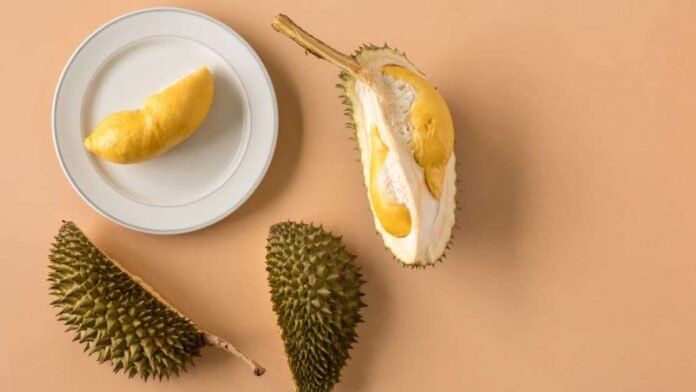Tropical fruit durian (Durio zibethinus) is from Southeast Asia, likely Borneo. Man has eaten durian for millennia, according to literature and carvings. Thailand, Malaysia, Indonesia, and Singapore celebrate durian seasonally.
Durian trees reach 100 feet tall with massive trunks and shiny leaves. Many months pass until the fruit is 12 inches wide and several pounds. Its prickly husk defends it from predators, and its pungent fragrance may attract seed-dispersers.
Durian cultivation requires love. The trees take years to develop and produce fruit, and the spiky husks make harvesting perilous. The durian’s short shelf life after harvesting adds intrigue and raises its price outside Southeast Asia.
A Mystery Nose-Wrinkling Durian Aroma
Durians are known for their stench. Those unfamiliar with the fruit may be overwhelmed by its rotten onion, overripe cheese, or sewer stench. Garlic and stinky cheeses smell bad due to a complex mix of volatile sulfur compounds.
The smell of durian varies by culture. Southeast Asia enjoys pleasant, juicy scents. Some locals prefer durian candy and cologne!
The science behind the durian’s foul scent is being researched. Some research suggests that ripe durians smell sweeter and taste better.
Discovering the Nutrient Powerhouse
Durian’s strong fragrance hides surprising health benefits. Its vitamins, minerals, and fiber enhance a balanced diet. Some of durian’s main nutrients and their health benefits:
- Vitamin C: Durian is high in Vitamin C, an antioxidant that enhances the immune system and fights free radicals, protecting cells and lowering chronic disease risk.
- B Vitamins: Durian contains thiamin, riboflavin, and niacin. These vitamins are necessary for metabolism, energy, and cell function.
- Potassium: Maintains blood pressure by opposing salt. Due to potassium, durian helps heart health.
- Fiber: High-fiber durian aids digestion and intestinal regularity. It modulates blood sugar and hunger.
- Other Minerals: Durian contains magnesium, phosphorus, and iron, which are essential for bone health, energy, and oxygen.
Beyond Basic Nutrition: Durian Health Benefits
Some studies suggest durian may provide health advantages, but more research is needed:
- Antioxidant Activity: Vitamin C and plant compounds in durian may protect cells and reduce cancer and heart disease risk.
- Blood Sugar Control: Most fruits have a higher GI than durian. It may help diabetics and people managing blood sugar because it doesn’t raise blood sugar. Eat durian carefully due to its high calorie content.
- Bone Health: Calcium, magnesium, and phosphorus, which durian offers, are required for bone health. Older people may benefit from a balanced diet that contains durian to avoid osteoporosis.
- Gut Health Improvement: Durian’s prebiotic fiber improves gut flora, digestion, immunity, and health.
- Anti-Cancer Properties: Several research suggest durian components may fight cancer. Confirmation and mechanism understanding require more investigation.
Consuming Durian: Tips and Considerations
Durian is nutritious, however there are several things to consider before consuming it:
- Smell: We know durians stink. Avoid it on public transportation and indoors.
- Calories: Fruit: Calories-rich durian. Alcohol can boost energy, but moderation is key. Balanced diet, moderate durian consumption.
- Diabetics: Durian possesses natural sugars despite low GI. Diabetics should see a doctor before eating durian.
- Medications: Durian may interact with blood thinners. If you take medicines, consult your doctor before eating durian.
Tips for durian enjoyment:
- Selection: Ripe durians taste best. Pick a durian with a soft, pressure-sensitive skin. Strong durian-specific fragrance indicates ripeness.
- Opening: Handle durian’s spiky husk gently to avoid injury. Opening fruit takes tools and gloves, therefore a merchant or you should do it.
- Taste: Fresh durian tastes best. You can eat it alone or in smoothies or desserts. The spicy durian flavor may not suit everyone. Try little bites to discover if you like it.
Durian: Cultural Icon and Gourmet Delight
Durian’s value goes beyond nutrition. Southeast Asia enjoys it as a seasonal treat and cultural mainstay. Regional durian festivals bring people together to feast. Many traditional dishes and desserts include durian, illustrating its versatility and cultural value.
Beyond Southeast Asia, durian is popular. Durian is loved globally for its taste and health benefits. Due of its short shelf life and strong smell, several jurisdictions may limit imports.
Conclusion: Discover Durian; Fruit
Despite its prickly shell, Durian is called the King of Fruits. The pungent scent may deter some, but those who persevere will enjoy rich flavors and health benefits. Durian is worth studying for its nutrients, cultural significance, and health advantages. So embrace durian when you see it. You may like Southeast Asian culture and find a new fruit!



